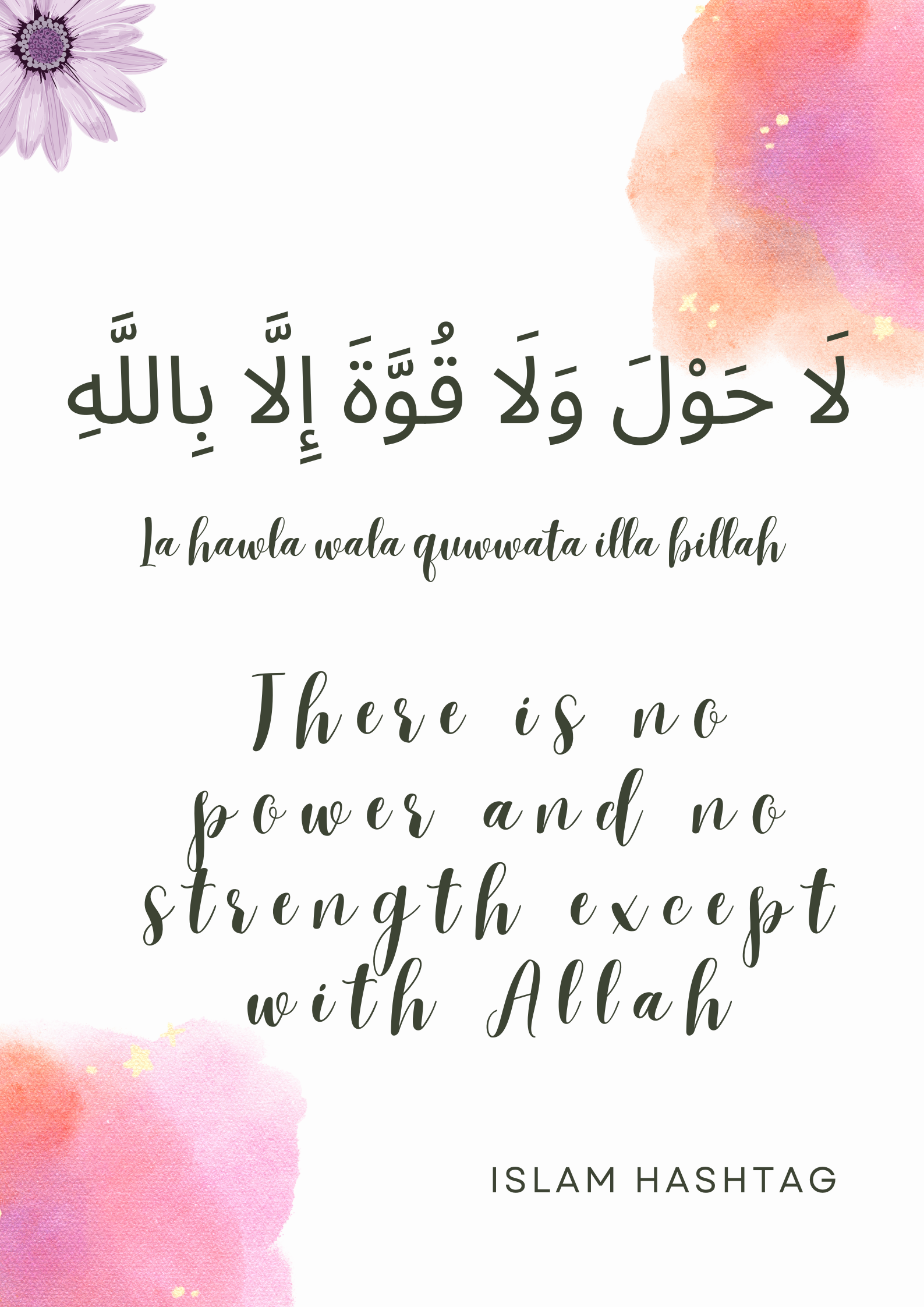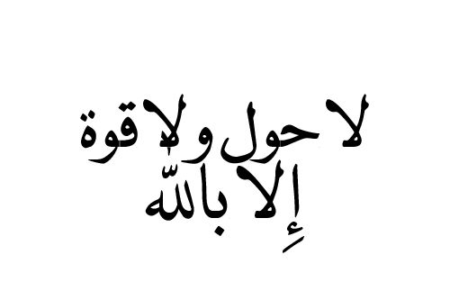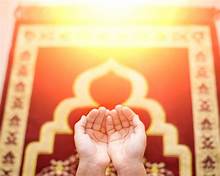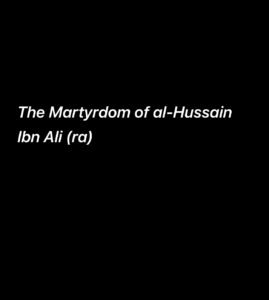La hawla wala quwwata illa billah,لا حول ولا قوة إلا بالله
Do you know that لَا حَوْلَ وَلَا قُوَّةَ إِلَّا بِاللَّهِ ( La hawla wala quwwata illa billah) is a dua and is one of the treasure of Paradise?
It was the wasiya given by Hazrat Ibrāhīm عليه السلام to Nabi صلى الله عليه وسلم to inform the ummah of Nabi صلى الله عليه وسلم to make this dua. It is a nuskha to become Pious.”
La hawla wala quwwata illa billah ” means There is no power and no strength except with Allah. La hawla wala quwwata illa billah is also called Hawqala. It is a remedy of 99 disease and it provides protection from shaytan. Let us read some facts about this beautiful dua.
La hawla wala quwwata illa billah meaning in Arabic
Its meaning is لا حول عن معصية الله إلا بعصمة الله ولا قوة على طاعة الله إلا بعون الله
– Nobody can save himself from sins except with the safeguarding of Allāh جل جلاله, and nobody can commit himself to do good, except with the help of Allāh جل جلاله
Hadrat Abdullah Ibn Mas’ud , a companion of the Prophet Muhammad ﷺ, narrates an enlightening incident. Once, in the presence of Rasulullah ﷺ, he recited the words “Laa Hawla walaa Quwwata Illa Billah.” The Prophet ﷺ, keen to impart wisdom, asked if he knew the meaning of these words. Upon Abdullah Ibn Mas’ud’s humble admission of ignorance, deferring to Allah and His Messenger’s superior knowledge, the Prophet ﷺ provided a profound explanation: “There is no ability (in anyone) to abstain from disobeying Allah and sinning, except by the protection of Allah. And there is no strength (in anyone) to obey Allah, except with the help of Allah.” This narration is found in Musnadul Bazzaar and cited in Maj’mauz Zawaaid.
Hadrat Maulana Abdul Ghani Sahib Phulpoori rahimullah further elucidates that this statement, though informative in nature (jumlah-khabriyyah), contains a supplicatory element (jumlah-inshaaiyyah). When a believer recites it, they are essentially imploring Allah, saying, “O Allah, I ask You to grant me the ability to abstain from disobeying You and sinning by protecting me, and to grant me the strength to obey You by helping me.” This interpretation is condensed from Ma’rifate Ilaahiyyah.

This phrase encompasses significant theological concepts, including:
- Dependency on Allah: It is an expression of seeking assistance from the Almighty. When someone seeks help from Allah (SWT), He aids them in fulfilling their needs and rectifying their affairs. Seeking assistance from Allah is one of the most virtuous acts of worship, as highlighted in Surah Al-Fatiha, where Allah instructs His servants to recite it daily: “You [alone] we worship, and You [alone] we ask for help” (Quran 1:5). Thus, this phrase signifies the devotion to seek Allah’s assistance.
- Acknowledgment of Divine Decree: This phrase implies recognition of divine predestination (Qadar). Believers affirm that nothing can happen without the will and power of Allah (SWT). They believe that Allah is the sole orchestrator of the universe, and nothing occurs except by His permission and decree. This acknowledgment leads to the concept of Tawheed (monotheism) in three aspects: the Oneness of Lordship, the Oneness of Names and Attributes, and the Oneness of Worship.
- Trust in Allah (Tawakkul): By saying “La Hawla Wala Quwwata Illa Billah,” individuals express their trust and reliance on Allah. It signifies complete surrender to Allah’s will, acknowledging one’s weakness and dependence on Him. In this relationship, Allah is the Self-Sufficient, while humans are utterly reliant on Him. They turn to Him, seeking His guidance and support, recognizing that He alone has full control over all matters.
Moreover, the phrase carries various benefits and virtues:

Why is La hawla wala quwwata illa billah Meaning termed as the treasure of paradise.
The phrase “La Hawla wa La Quwwata Illa Billah” has been termed a treasure from the treasures of Jannah (Paradise) for several compelling reasons:
- Similar to a Hidden Treasure: Like a treasure that is immensely valuable yet hidden, the true value of this phrase was not known to the people until the Prophet Muhammad ﷺ revealed it to his followers. This saying is not only precious in its nature but also because it brings with it a multitude of benefits—both in this world and especially in the Hereafter, in Jannah.
- Transformation into a Treasure in Jannah: The phrase is said to transform into a real treasure for the one who recites it in Jannah. This means that its recitation in this life will result in the acquisition of an actual treasure in the eternal life to come, thereby adding to the reciter’s bounties in Paradise.
- Accumulation of Spiritual Wealth: Reciting this phrase builds up a spiritual wealth for the individual, akin to accumulating treasures of wealth and luxuries in Jannah. It is as if every recitation is an investment in the afterlife, yielding eternal dividends.
- Acquisition of Great Rewards: The consistent utterance of this phrase ensures that the reciter acquires great rewards in Jannah. It is not just any reward, but treasures that correspond to the highest rewards possible in the hereafter.
- Negation of Self-Ability and Reliance on Allah’s Mercy: The recitation of this phrase involves negating any inherent ability and strength in oneself, and attributing all power and might to Allah’s protection and help. By doing so, the believer is seeking to derive strength and ability directly from Allah. In essence, the individual is attaching themselves to Allah’s eternal mercies, which are described as treasures because they safeguard against sin and enable obedience to Allah. These mercies do not just protect in the temporal sense but promise to yield good actions (AlBaaqiyaatus Saalihaat) which are enduring and whose rewards continue to benefit the believer in Jannah.
The concept of these words being a treasure is deeply rooted in the idea that they connect the believer to Allah’s never-ending mercy, which in turn leads to righteous actions that remain forever. The aforementioned benefits are extensively discussed in Islamic literature, such as in “Mirqaatul Mafaateeh” by Mulla Ali Qari, and highlighted in various other scholarly works, underscoring the profound significance of this phrase within the Islamic tradition.
Benefit of ” la hawla wala quwwata illa billah” in hadith:
- A Cure for Diseases and a Means of Spiritual Growth
وَعَنْ أَبِي هُرَيْرَةَ قَالَ: قَالَ رَسُولُ اللَّهِ صَلَّى اللَّهُ عَلَيْهِ وَسَلَّمَ: «لَا حَوْلَ وَلَا قُوَّةَ إِلَّا بِاللَّهِ دَوَاءٌ مِنْ تِسْعَةٍ وَتِسْعِينَ دَاء أيسرها الْهم»
Abu Huraira reported Rasul Allah as saying that “There is no might and no power except in God” is a remedy for ninety-nine diseases, the lightest of which is anxiety.(mishkat al masabih)
The phrase is a cure for 99 diseases, the least of which is hamm, a profound grief or worry. This is supported by the hadith in AlMu’jamul Awsat of Tabraani. Furthermore, Hadrat Ibrahim conveyed to the Prophet ﷺ during the night of Mi’raaj that the Ummah should increase their trees and plants in Jannah by reciting these words, as mentioned in Musnad Ahmad and Sahih Ibn Hibbaan.
When a servant recites this phrase, Allah ﷻ responds, announcing to the angels, “My servant has handed over all matters to Me and has submitted himself,” as found in Fathul Baari and Mustadrak of Haakim. This reflects complete trust and submission to Allah.
The phrase can also be recited with additional words: “Laa hawla walaa quwwata illaa billahil aliyyil azeem.” These words are established in various narrations and emphasize the grandeur of Allah ﷻ, helping the believer realize their own insignificance and fostering true servitude (abdiyat) and humility before Allah.
- You can also read this dua if you are scared as it provides protection from shaytan. The Prophet (ﷺ) said: When a man goes out of his house and says: “In the name of Allah, I trust in Allah; there is no might and no power but in Allah,” the following will be said to him at that time: “You are guided, defended and protected.” The devils will go far from him and another devil will say: How can you deal with a man who has been guided, defended, and protected? [Sahih Al-Albani]
- If someone is short of sustenance and he wants wealth, then he should read this Dua of Anas bin Malik. It is narrated from Prophet Musa (peace be upon him) that Prophet Muhammad (ﷺ) said. He who recites this prayer 100 times a day will never be dependent on anyone except Allah.
- The Prophet’s (peace and blessings upon him) Recommendation: The Prophet Muhammad (peace be upon him) encouraged the frequent use of this phrase. When the call to prayer (Adhan) is heard, the caller says, “Hayya ‘ala-s-Salah” (come to prayer), and the response is, “La Hawla Wala Quwwata Illa Billah.” Similarly, when the caller says, “Hayya ‘ala-l-Falah” (come to success), the response is again, “La Hawla Wala Quwwata Illa Billah.” This practice reinforces trust in Allah’s decree and power.
- Divine Acceptance: Allah accepts the dua of those who sincerely utter this phrase. When a person says, “La Hawla Wala Quwwata Illa Billah,” Allah responds with divine blessings and protection. The Prophet Muhammad (peace be upon him) said that when someone says, “La Ilaha Illa Allah, Wahdahu La Sharika Lahu, La Hawla Wala Quwwata Illa Billah” (There is no god but Allah, He is alone, and there is no partner with Him; there is no power and no might except with Allah), their sins are forgiven, even if they are as abundant as the foam of the sea.
- Protection from Evil: Uttering this phrase, along with the Basmala (saying “Bismillah” or “In the name of Allah”) and putting trust in Allah, provides protection from the influence of Satan. It safeguards individuals from harm and negative influences.
- A Key to Paradise: It is narrated that when the Prophet Muhammad (peace be upon him) ascended to the heavens during the Isra and Mi’raj, he encountered the Prophet Ibrahim (peace be upon him). Ibrahim advised the Prophet Muhammad to encourage his followers to use this phrase frequently, as it is among the treasures of Paradise.
la hawla wala quwwata illa billah in Arabic:
لَا حَوْلَ وَلَا قُوَّةَ إِلَّا بِاللَّهِ
la hawla wala quwwata illa billah meaning in English
La hawla wa la quwwata illa billah
la hawla wala quwwata illa billah meaning in English
There is no power and no strength except with Allah.
| Arabic | transliteration | meaning |
| لَا | La | no |
| حَوْلَ | hawla | might |
| وَلَا | wa la | and no |
| قُوَّةَ | Quwwata | Power |
| إِلَّا | illa | except |
| بِاللَّهِ | billah | with Allah |
La Hawla Wala Quwwata Illa Billahil Aliyyil Azeem Meaning In Urdu
گناہ سے بچنے کی طاقت اور نیکی کی ہدایت صرف اللہ کی طرف سے ہے جو سب سے بلند ہے۔عظمت والا ہے

la hawla wala quwwata illa billah full dua in Quran
لَا حَوْلَ وَلَا قُوَّةَ إِلَّا بِٱللَّٰهِ ٱلْعَلِيِّ ٱلْعَظِيمِ
La Hawla Wala Quwwata Illa Billahil Aliyyil Azeem we mean “There is neither might and nor power except with Allah (ﷻ), the Exalted, the Great”.
- la hawla wa quwwata: means There is no might and no power ( except with Allah)
- wa la quwwata illa billah: means and no power except with Allah ( i.e. Only Allah has the power to do all things)
- illa billa hil aliyyil azeem-except with Allah (ﷻ), the Exalted, the Great”.
Allah says:in surah Kahf:(18:39)
وَلَوۡلَآ إِذۡ دَخَلۡتَ جَنَّتَكَ قُلۡتَ مَا شَآءَ ٱللَّهُ لَا قُوَّةَ إِلَّا بِٱللَّهِۚ إِن تَرَنِ أَنَا۠ أَقَلَّ مِنكَ مَالًا وَوَلَدًا
“Why, when you entered your garden, did you not say, (Everything is) as Allah wills. There is no power except with Allah? If you see me inferior to you in wealth and children.”
The treasure of paradise: لَا حَوْلَ وَلَا قُوَّةَ إِلَّا بِاللَّهِ
Laa hawla walaa quwwata illaa billaah, is one of Paradise’s treasures.
The Messenger (ﷺ) said: Shall I not tell you of a word which is one of the treasures of Paradise?’ I said: ‘Yes, O Messenger of Allah.’ He said: ‘Say: La hawla wa la quwwata illa billah (There is no power and no strength except with Allah).
وروى البخاري (4205) ، ومسلم (2704) من حديث أبي موسى الأشعري رضي الله عنه أن رسول الله صلى الله عليه وسلم قال له: يَا عَبْدَ اللَّهِ بْنَ قَيْسٍ ، قُلْتُ : لَبَّيْكَ يَا رَسُولَ اللَّهِ ، قَالَ : أَلَا أَدُلُّكَ عَلَى كَلِمَةٍ مِنْ كَنْزٍ مِنْ كُنُوزِ الْجَنَّةِ ؟ قُلْتُ : بَلَى ، يَا رَسُولَ اللَّهِ ، فَدَاكَ أَبِي وَأُمِّي قَالَ: لَا حَوْلَ وَلَا قُوَّةَ إِلَّا بِاللَّهِ
We should make this dua 5 or 7 times after every ṣalāh with the intention to gain piety. This treasure is given to us despite being in this world. This dua can lead us to enter Jannah.
Read more short dua to read every day
When to say lahawla wala quwwata illa billah
We say in following conditions:
- When the muazeen says “Hayya alas salaah (come to prayer)” or “Hayya alal falah (come to success)”.
- When one faces a challenge, problem, or difficulty that seems beyond one’s control or ability.
- When one witnesses or hears about a calamity, tragedy, or injustice that affects oneself or others.
- When one feels overwhelmed, stressed, or anxious about something or someone.
- When one wants to express one’s submission and surrender to the will and plan of Allah.
- When one wants to seek forgiveness and mercy from Allah for one’s sins and mistakes.
- When turning over at night
- In difficult situation
- In fear
- to seek protection from shaitan
- When things does not work according to your plans
- As a zikr to remember Allah
- Before leaving tho house (for protection)
- After salah
Conclusion
The virtues and benefits of “La Hawla wa La Quwwata Illa Billah” encompass a wide range of effects on a our life. From spiritual enrichment to protection against pride, from fostering self-reformation to providing solutions to life-threatening problems, and from offering an exit from all difficulties to securing a treasure trove of rewards in Jannah, the phrase is a comprehensive tool in the believer’s spiritual arsenal.
Prominent scholars and spiritual guides have emphasized the importance of this phrase in various contexts. It has been recommended as a daily recitation for self-purification, a remedy for spiritual ailments, and even a strategy for dealing with life’s challenges. Whether the believer is seeking to deepen their connection with Allah, overcome personal shortcomings, or navigate through life’s trials, “La Hawla wa La Quwwata Illa Billah” holds the promise of Allah’s unfailing support and grace.
By understanding and embracing the depth of this saying, we can unlock divine mercies, strengthen their faith, and traverse the path of righteousness with the assurance of Allah’s protection and aid.
If someone is short of sustenance and he wants wealth, then he should read this Dua.

Reference:
- حين تحدث عنها رسول الله صلى الله عليه و سلم قال أنها كنز من كنوز الجنة حيث قال عن أبي موسى الأشعري :«أن النبي صلى الله عليه و سلم قال: ألا أعلمك كلمة هي كنز من كنوز الجنة؟ لا حول ولا قوة إلا بالله.» .
- – و قد طالبنا رسول الله بالإكثار من قولها حيث قال عن أبي هريرة :«أن النبي قال: أكثروا من قول: لا حول ولا قوة إلا بالله. فإنها كنز من كنوز الجنة.»
- فعَنْ أَبِي الزُّبَيْرِ قَالَ كَانَ ابْنُ الزُّبَيْرِ يَقُولُ فِي دُبُرِ كُلِّ صَلاةٍ حِينَ يُسَلِّمُ : ( لا إِلَهَ إِلا اللَّهُ وَحْدَهُ لا شَرِيكَ لَهُ لَهُ الْمُلْكُ وَلَهُ الْحَمْدُ وَهُوَ عَلَى كُلِّ شَيْءٍ قَدِيرٌ لا حَوْلَ وَلا قُوَّةَ إِلا بِاللَّهِ لا إِلَهَ إِلا اللَّهُ وَلا نَعْبُدُ إِلا إِيَّاهُ لَهُ النِّعْمَةُ وَلَهُ الْفَضْلُ وَلَهُ الثَّنَاءُ الْحَسَنُ لا إِلَهَ إِلا اللَّهُ مُخْلِصِينَ لَهُ الدِّينَ وَلَوْ كَرِهَ الْكَافِرُونَ ) وَقَالَ : ” كَانَ رَسُولُ اللَّهِ صَلَّى اللَّهُ عَلَيْهِ وَسَلَّمَ يُهَلِّلُ بِهِنَّ دُبُرَ كُلِّ صَلاةٍ ” رواه مسلم في صحيحه / 935.
- فعن حَفْصِ بْنِ عَاصِمِ بْنِ عُمَرَ بْنِ الْخَطَّابِ عَنْ أَبِيهِ عَنْ جَدِّهِ عُمَرَ بْنِ الْخَطَّابِ قَالَ : قَالَ رَسُولُ اللَّهِ صَلَّى اللَّهُ عَلَيْهِ وَسَلَّمَ : ( إِذَا قَالَ الْمُؤَذِّنُ اللَّهُ أَكْبَرُ اللَّهُ أَكْبَرُ فَقَالَ أَحَدُكُمْ اللَّهُ أَكْبَرُ اللَّهُ أَكْبَرُ ثُمَّ قَالَ أَشْهَدُ أَنْ لا إِلَهَ إِلا اللَّهُ
- قَالَ أَشْهَدُ أَنْ لا إِلَهَ إِلا اللَّهُ ثُمَّ قَالَ أَشْهَدُ أَنَّ مُحَمَّدًا رَسُولُ اللَّهِ قَالَ أَشْهَدُ أَنَّ مُحَمَّدًا رَسُولُ اللَّهِ ثُمَّ قَالَ حَيَّ عَلَى الصَّلاةِ قَالَ لا حَوْلَ وَلا قُوَّةَ إِلا بِاللَّهِ ثُمَّ قَالَ حَيَّ عَلَى الْفَلاحِ قَالَ لا حَوْلَ وَلا قُوَّةَ إِلا بِاللَّهِ ثُمَّ قَالَ اللَّهُ أَكْبَرُ اللَّهُ أَكْبَرُ قَالَ اللَّهُ أَكْبَرُ اللَّهُ أَكْبَرُ ثُمَّ قَالَ لا إِلَهَ إِلا اللَّهُ قَالَ لا إِلَهَ إِلا اللَّهُ مِنْ قَلْبِهِ دَخَلَ الْجَنَّةَ ) رواه مسلم في صحيحه / 578 ، وأبو داوود في سننه / 443 .
reference of some hadith- sunnah.com. Support this website by buying some of our – Islamic worksheets
P.S : If you want to share the article, pls consider sharing the link to the article (Proper attribution) so that In sha Allah we write more well researched article.
Discover more from Islam Hashtag
Subscribe to get the latest posts sent to your email.




